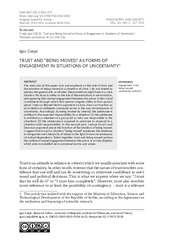Приказ основних података о документу
Trust and ‘Being Moved’ as Forms of Engagement in Situations of Uncertainty
Poverenje i ganutost kao forme angažmana u situacijama neizvesnosti
| dc.creator | Cvejić, Igor | |
| dc.date.accessioned | 2023-07-14T08:44:53Z | |
| dc.date.available | 2023-07-14T08:44:53Z | |
| dc.date.issued | 2023 | |
| dc.identifier.issn | 0353-5738 | |
| dc.identifier.uri | https://journal.instifdt.bg.ac.rs/index.php/fid/article/view/1563 | |
| dc.identifier.uri | http://rifdt.instifdt.bg.ac.rs/123456789/2856 | |
| dc.description.abstract | The main aim of this paper is to put emphasis on the role of trust and the emotion of being moved in a situation of crisis. I do not intend to address the general role, or all roles, these emotions might have in a crisis situation. My focus is rather on the role of these emotions in we-formation, presupposing that mutual engagement between the actors is the crucial constituent through which first-person singular shifts to first-person plural. I rely on Bennet Helm’s argument on how trust can function as an invitation to delineate communal norms in the new circumstances of uncertainty. Accordingly, by being trusted by other(s), the addressee is entitled to the expected responsibility for a situation: (1) the addressee is entitled as a member of a group (of us who are responsible in the situation); (2) the addressee is exposed to pressure to respond to a situation with responsibility. In the second part, I adopt Cova’s and Deonna’s argument about the function of the emotion of being moved. I suggest that in such a situation “being moved” expresses the readiness to reorganize one’s hierarchy of values in the light of new circumstances of mutual dependency. Taken together, trust and being moved portray the outline of mutual engagement between the actors in a crisis situation which aims to establish new communal norms and values. | sr |
| dc.description.abstract | Glavna namera ovog teksta je da naglasi ulogu poverenja i ganutosti u kriznim situacijama. Neću se baviti opštom ulogom, ili svim ulogama ovih emocija u krizi. Fokus će pre biti usmeren na ulogu ovih emocija u formiranju „mi“, pretpostavljajući da je uzajamni angažman između aktera suštinski faktor putem koga prvo lice jednine prelazi u prvo lice množine. Oslanjaću se na argument Beneta Helma o tome kako poverenje figurira kao poziv da se iscrtaju komunalne norme u novim okolnostima neizvesnosti. Prema ovom argumentu, kada mu drugi veruju, primalac poverenja je oslovljen za relevantnu odgovornost u datoj situaciji: (1) primalac poverenja je oslovljen kao član grupe (nas koji smo odgovorni); (2) primalac poverenja je izložen pritisku da odgovori na datu situaciju sa odgovornošću. U drugom delu članku prilagodiću argument koji su izneli Kova i Deona o funkciji ganutosti. Sugerisaću da u kriznim situacijama ganutost izražava spremnost da reorganizujemo hijerarhiju vrednosti u svetlu novih okolnosti međusobne zavisnosti. Uzete zajedno, emocije poverenja i ganutosti ocrtavaju skicu uzajamnog angažmana između aktera u situacijama krize, kako bi se ustanovile nove komunalne norme i vrednosti. | sr |
| dc.language.iso | en | sr |
| dc.publisher | Beograd : Institut za filozofiju i društvenu teoriju | sr |
| dc.relation | info:eu-repo/grantAgreement/MESTD/inst-2020/200025/RS// | sr |
| dc.rights | openAccess | sr |
| dc.rights.uri | https://creativecommons.org/licenses/by-nc-nd/4.0/ | |
| dc.source | Filozofija i društvo / Philosophy and Society | sr |
| dc.subject | engagement | sr |
| dc.subject | trust | sr |
| dc.subject | being moved | sr |
| dc.subject | uncertainty | sr |
| dc.subject | emotion | sr |
| dc.title | Trust and ‘Being Moved’ as Forms of Engagement in Situations of Uncertainty | sr |
| dc.title | Poverenje i ganutost kao forme angažmana u situacijama neizvesnosti | sr |
| dc.type | article | sr |
| dc.rights.license | BY-NC-ND | sr |
| dc.citation.issue | 2 | |
| dc.citation.volume | 34 | |
| dc.citation.spage | 248 | |
| dc.citation.epage | 256 | |
| dc.identifier.doi | 10.2298/FID2302248C | |
| dc.type.version | publishedVersion | sr |
| dc.identifier.fulltext | http://rifdt.instifdt.bg.ac.rs/bitstream/id/9870/bitstream_9870.pdf |

